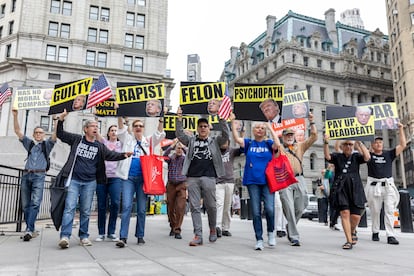Judge delays Trump’s sentencing in Stormy Daniels case until after election
The decision was scheduled for September 18 after being first pushed back due to the Supreme Court’s ruling on presidential immunity

Judge Juan Merchan decided on Friday to postpone issuing a sentence against Donald Trump for the Stormy Daniels case, where he was found guilty of 34 felony counts over falsifying business records. As a result of the verdict, Trump — who is the Republican Party’s nominee for president — became the first former president to be convicted of felony crimes.
Trump was scheduled to be sentenced on September 18, but Merchan has decided to postpone it until after the November elections, in what is a big win for the Republican candidate. The former president is facing three other cases, but the start dates for the trials — if they are held at all — have also been postponed until after the election.
Trump was convicted of falsifying invoices, checks and accounting records to conceal $130,000 in hush money to porn star Stormy Daniels, who was paid to keep her quiet about an alleged affair that could have hurt his chances of winning the 2016 election. Falsifying business records is punishable by up to four years in prison, though the sentences for each count can be served concurrently. It is unlikely that Trump would have been sent to prison as he has no criminal record, but it was not completely out of the question. Typically, the convicted person is released on probation or fined.
This is the second time Judge Merchan has postponed sentencing, which was initially scheduled for July 11. Following the Supreme Court’s ruling in July, which granted presidents broad criminal immunity for official acts, the judge set a deadline for both sides to present their arguments. Merchan said he would rule on the immunity question on September 16, and planned to sentence Trump, if necessary, on September 18.
Trump asked that the ruling be delayed until after the November 5 presidential election, arguing that a ruling just weeks before the vote could constitute election interference. On Friday, the judge has granted his request.
The decision comes after Trump’s failed attempt on Tuesday to postpone sentencing. The former president’s defense team asked a federal court to take over the hush money case, which would have extended the proceedings indefinitely and prevented a sentencing before the presidential election on November 5. Judge Alvin Hellerstein, however, said that the federal court did not have jurisdiction over the case in a strongly worded four-page ruling.
Trump wanted the case moved to federal court precisely so he could seek to vacate the verdict in the wake of the Supreme Court’s ruling on presidential immunity. “Nothing in the Supreme Court’s opinion affects my previous conclusion that the hush money payments were private, unofficial acts, outside the bounds of executive authority,” Hellerstein wrote.
On Thursday, Judge Tanya Chutkan issued a two-page order outlining the next steps in the federal case against Trump for his efforts to subvert the results of the 2020 election, which he lost to Joe Biden. There will be no trial before the election, but the prosecution will be able to present new evidence and documents in support of the charges, including transcripts of statements, as early as September. That evidence, some of it that has never been seen before, will therefore be revealed to the public before the U.S. goes to the polls.
Sexual abuse
In his busy court schedule, Donald Trump also went to a New York court on Friday to appeal against the jury’s verdict that found him liable for sexual abuse and defamation in a civil suit brought by the writer E. Jean Carroll. The jury ordered Trump to pay $5 million to the victim. In another subsequent defamation suit by Carroll, another jury ordered him to pay an additional $83 million.
Trump’s motorcade was greeted outside the court by protesters carrying signs with messages such as “guilty,” “rapist,” “criminal,” and “psychopath.”

In an appeals court hearing, Trump’s lawyer, John Sauer, argued that the trial had been tainted by poor evidence. “This case is a textbook example of implausible allegations being propped up by highly inflammatory, inadmissible propensity evidence,” Sauer said, according to AP, noting that the jury was allowed to consider elements such as the infamous Access Hollywood tape in which Trump about grabbing women’s genitals.
Trump’s lawyers also argued that a new trial should be held in part because the trial judge, Lewis A. Kaplan, improperly allowed two other women to testify about similar acts of sexual abuse they say Trump committed against them in the 1970s and in 2005.
In her book What Do We Need Men For? A Modest Proposal, Carroll recounted that Trump had raped her in the changing room of a luxury department store in Manhattan in 1995 or 1996. At the time, Carroll was hosting the television show Ask E. Jean, inspired by her famous column in Elle magazine, which gave sex and relationship advice.

In her book, Carroll recounts how she bumped into Trump at the Bergdorf Goodman department store in New York, and he asked her to help him find a gift for a woman. The columnist said that Trump took her first to the handbag section, then to the hat section, and finally to the lingerie section. According to her account, Trump grabbed a lilac-gray bodysuit, asked her to try it on, and walked her out.
“The moment the dressing-room door is closed, he lunges at me, pushes me against the wall, hitting my head quite badly, and puts his mouth against my lips. I am so shocked, I shove him back and start laughing again. He seizes both my arms and pushes me up against the wall a second time, and, as I become aware of how large he is, he holds me against the wall with his shoulder and jams his hand under my coat dress and pulls down my tights․ The next moment, still wearing correct business attire, shirt, tie, suit jacket, overcoat, he opens the overcoat, unzips his pants, and, forcing his fingers around my private area, thrusts his penis halfway — or completely, I’m not certain — inside me,” she writes in the book, explaining that she was able to escape after a struggle.
The jury found that Trump liable for sexual abuse, but not rape. Carroll, 80, testified at the trial, but Trump did not take the stand. On Friday, both Trump and Carroll attended the hearing at the Court of Appeals. The former president was not required to be in court, but he used the court appointment to present himself as a victim of political persecution.
Speaking to the press after his court appearance on Friday, Trump called the court’s initial ruling “ridiculous.” In the past, he also claimed he never met Carroll and did not even know who she was, although he later acknowledged that they appear together in a photo. On Friday, he also referred to other cases he is facing, arguing the judges are very “hostile” towards him. A decision on his appeal is not expected before the elections.
Sign up for our weekly newsletter to get more English-language news coverage from EL PAÍS USA Edition
Tu suscripción se está usando en otro dispositivo
¿Quieres añadir otro usuario a tu suscripción?
Si continúas leyendo en este dispositivo, no se podrá leer en el otro.
FlechaTu suscripción se está usando en otro dispositivo y solo puedes acceder a EL PAÍS desde un dispositivo a la vez.
Si quieres compartir tu cuenta, cambia tu suscripción a la modalidad Premium, así podrás añadir otro usuario. Cada uno accederá con su propia cuenta de email, lo que os permitirá personalizar vuestra experiencia en EL PAÍS.
¿Tienes una suscripción de empresa? Accede aquí para contratar más cuentas.
En el caso de no saber quién está usando tu cuenta, te recomendamos cambiar tu contraseña aquí.
Si decides continuar compartiendo tu cuenta, este mensaje se mostrará en tu dispositivo y en el de la otra persona que está usando tu cuenta de forma indefinida, afectando a tu experiencia de lectura. Puedes consultar aquí los términos y condiciones de la suscripción digital.








































